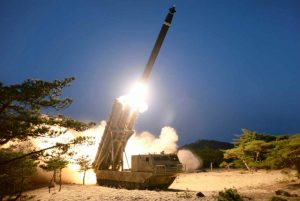North Korea’s leader Kim Jong Un still denies that his country suffers from the coronavirus. But reports in South Korean media seem to indicate otherwise, suggesting as many as 180 dead and 24,842 released from quarantine. In fact, Pyongyang has already ordered tough social distancing measures that are hurting North Korea’s already-strained economy. When North Korea is hurting, it has a history of lashing out, hoping to start negotiations for aid or sanctions relief. On Tuesday, this happened again: North Korea fired cruise missiles off its east coast. To avoid falling into another escalation cycle, Washington must have a plan for the next time Pyongyang acts up.
Washington does not have the bandwidth or resources to fight another major war and this is made clearer by the coronavirus crisis. Since social distancing measures began in the United States, 16.6 million Americans have filed for unemployment. The U.S. economic toll is still rising and may end up costing $4 trillion. Americans do not want another war and North Korea has deadly nuclear missiles that can probably reach most U.S. cities. These are sound reasons why Washington should not overreact to North Korea’s resumption of its habitual missile tests.
North Korea’s leaders always try to make themselves look strong, especially during a period of economic hardship. This is done to help the Kim dynasty keep control and also to set the stage for negotiations with America. The way it works is that North Korea does something scary to create a crisis and then turns around and asks to negotiate. Pyongyang then gives up something in return for humanitarian aid or sanctions relief. By doing this, successive Kims have been able to get economic help, easing the pressures on their government and people.
Also, acting tough and then presenting negotiated deals as concessions plays well for North Korea’s domestic propaganda. This pattern lets Kim claim to North Korea’s starving millions that their hardship is not for naught.
And times are getting tough. North Korea has shut down schools, and recently cut military officer food rations by a third. More importantly, Pyongyang has stopped cross border trade and smuggling with China — even illicit ship-to-ship transfers at sea. These are desperate anti-COVID-19 measures because they come at a steep economic cost that Kim’s otherwise cash-strapped regime would never accept. North Korea is smuggling in face masks and other personal protective equipment while working to quickly build a new Pyongyang General Hospital. Meanwhile, the lean season is approaching, causing more worries as the price of rice rises despite Pyongyang’s price controls. All this shows that Kim is in very dire economic straits. Moreover, although humanitarian aid does get sent to North Korea, it has to go through a time-consuming and cumbersome exceptions process with the United Nations.
Make no mistake that Kim will lash out again. More numerous short-to-mid-range missile tests or military exercises are coming. If these fail to get Washington’s attention, Pyongyang may even be tempted to conduct intercontinental ballistic missile tests or even another underground nuclear test.
Regular missile tests are not inherently a threat to U.S. security—indeed, our conventional and nuclear deterrence capabilities have proved remarkably efficient at enacting a tolerable détente. Still, peace is a worthy goal.
Should America seek to bring North Korea back to the negotiating table, Washington must accept that an up-front denuclearization deal is a fantasy since Kim sees weapons of mass destruction as the best way to protect himself from attack and ensure his regime’s survival. Thankfully, U.S. national interests lie more in keeping things peaceful and stable rather than in trying to achieve long-shot denuclearization and regime change at any cost. America’s own nuclear weapons and mighty conventional forces can—and will continue to—deter North Korea. Therefore, Washington should focus more on long-term peace rather than Pyongyang’s predictable provocations or achieving a deal.
North Korea will always act tough to achieve its objectives. America should stop being caught off-guard, and must instead anticipate Kim’s actions. Missile tests are not good. But they are not so threatening that they require a U.S. military response—a response that may trigger a nuclear war. Instead, Washington should anticipate that Kim will lash out soon—we should then be ready to bring him back to the negotiating table.
Seeing Pyongyang’s patterns for what they are prevents U.S. policymakers from overreacting or misreading North Korean intentions. America already deters North Korea — it just needs to understand Pyongyang’s patterns and use them to advance American interests.
John Dale Grover is a fellow with Defense Priorities. He is also an assistant managing editor at The National Interest and a Korean studies fellow at the Center for the National Interest.

































